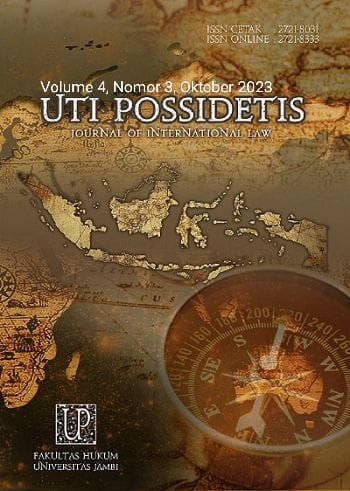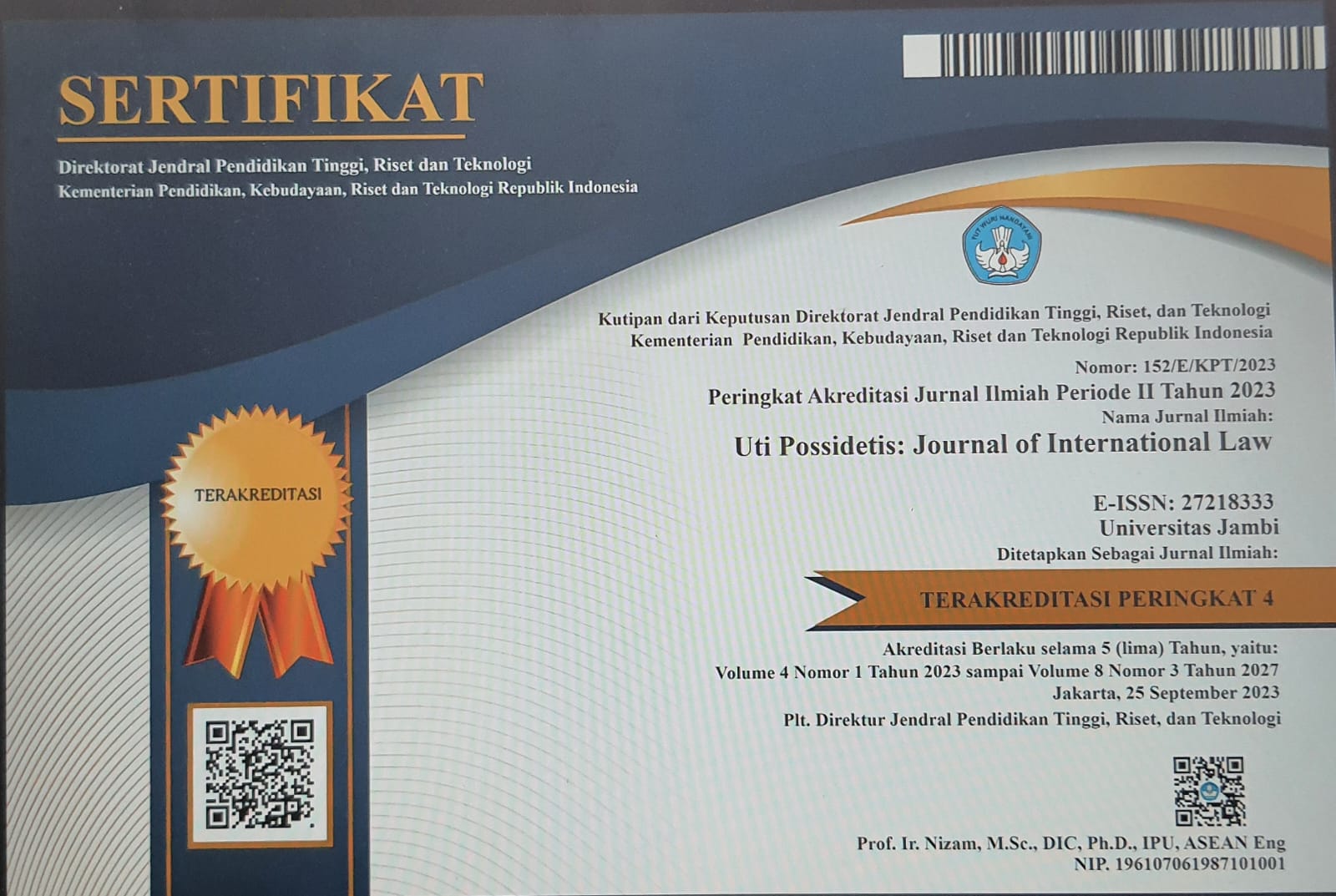Pengaturan Hukum Internasional Terhadap Limbah Makanan dan Dinamikanya di Indonesia
DOI:
https://doi.org/10.22437/up.v4i3.25318Keywords:
international law;, food waste;, environmentAbstract
The problem of food waste has become one of the increasingly concerning environmental issues in Indonesia. Improperly managed food waste, such as air, water, and soil pollution, can negatively impact the environment. This article aims to discuss the impacts of food waste on the environment, international legal regulations related to the issue, and the latest developments in Indonesia in addressing food waste. The research method used in this study is a literature review using scientific journals, books, and related documents. The results show that food waste can cause severe environmental damage and needs to be addressed seriously. Countries have adopted several international legal rules to address the problem of food waste, such as the Basel Convention and the Stockholm Declaration. In Indonesia, efforts to address food waste have been made, such as by promoting food waste reduction through education campaigns and waste recycling programs. However, more significant and integrated efforts are needed from the government, society, and private sector to address the problem of food waste effectively. In conclusion, this article emphasizes the need for coordinated and comprehensive action to address the increasingly concerning problem of food waste at the local and global levels.
Keywords: international law; food waste; environment
Downloads
References
Amalina, Nasya Nurul. “Pendekatan Quadruplehelix Dalam Menanggulangi Problematika Sampah Makanan Di Indonesia Ditinjau Dari Perspektif Hukum.†Padjadjaran Law Research & Debate Society 10, no. 2 (2022).
Bajželj, Bojana, Thomas E. Quested, Elin Röös, and Richard P.J. Swannell. “The Role of Reducing Food Waste for Resilient Food Systems.†Ecosystem Services 45, no. July (2020): 101140. https://doi.org/10.1016/j.ecoser.2020.101140.
Bambang Hermanu. “Pengelolaan Limbah Makanan (Food Waste) Berwawasan Lingkungan Environmentally Friendly Food Waste Management.†Jurnal Agrifoodtech 1, no. 1 (2022): 1–11.
Barker, Hannah, Peter J. Shaw, Beth Richards, Zoe Clegg, and Dianna M. Smith. “Towards Sustainable Food Systems: Exploring Household Food Waste by Photographic Diary in Relation to Unprocessed, Processed and Ultra-Processed Food.†Sustainability (Switzerland) 15, no. 3 (2023).
Chaerul, Mochammad, and Sharfina Ulfa Zatadini. “Perilaku Membuang Sampah Makanan Dan Pengelolaan Sampah Makanan Di Berbagai Negara: Review.†Jurnal Ilmu Lingkungan 18, no. 3 (2020): 455–466.
Colin, W. “Trigeminal Intraoral Schwannomas.†Compendium (Newtown, Pa.) 11, no. 11 (1990).
Dihni, Vika Azkiya. “Produksi Sampah Makanan Indonesia Tertinggi Di Asia Tenggara.†Databoks, 22AD. https://databoks.katadata.co.id/datapublish/2022/06/27/produksi-sampah-makanan-indonesia-tertinggi-di-asia-tenggara.
Ekardt, Felix. Sustainability,Transformation, Governance, Ethics, Law. Springer, 2019.
FAO. Food Waste Index Report 2021. Unep, 2021.
Garske, Beatrice, Katharine Heyl, Felix Ekardt, Lea Moana Weber, and Wiktoria Gradzka. “Challenges of Food Waste Governance: An Assessment of European Legislation on Food Waste and Recommendations for Improvement by Economic Instruments.†Land 9, no. 7 (2020): 1–23.
Giordano, Claudia, and Silvio Franco. “Household Food Waste from an International Perspective.†Sustainability (Switzerland) 13, no. 9 (2021): 1–9.
Jamaludin, Husna, Hashim Suliman Elshreef Elmaky, and Sarina Sulaiman. “The Future of Food Waste: Application of Circular Economy.†Energy Nexus 7, no. December 2021 (2022): 100098. https://doi.org/10.1016/j.nexus.2022.100098.
Kim, Mi Hyung, Yul Eum Song, Han Byul Song, Jung Wk Kim, and Sun Jin Hwang. “Evaluation of Food Waste Disposal Options by LCC Analysis from the Perspective of Global Warming: Jungnang Case, South Korea.†Waste Management 31, no. 9–10 (2011): 2112–2120. http://dx.doi.org/10.1016/j.wasman.2011.04.019.
Kim, Sanghyo, and Sang Hyeon Lee. “Examining Household Food Waste Behaviors and the Determinants in Korea Using New Questions in a National Household Survey.†Sustainability (Switzerland) 12, no. 20 (2020): 1–24.
Lucifero, Nicola. “Food Loss and Waste in the EU Law between Sustainability of Well-Being and the Implications on Food System and on Environment.†Agriculture and Agricultural Science Procedia 8 (2016): 282–289.
Michael Blakeney, Food Loss and Food Waste: Causes and Solutions. Food Loss and Food Waste: Causes and Solutions,. Edward Elgar Publishing, 2019.
Nations, United. “Monitoring Emission Targets,†2020. https://unfccc.int/kyoto_protocol?gclid=EAIaIQobChMI5YPi0oaI_wIVWGsrCh0fTw54EAAYASAAEgKF0PD_BwE.
Okumus, Bendegul. “How Do Hotels Manage Food Waste? Evidence from Hotels in Orlando, Florida.†Journal of Hospitality Marketing and Management 29, no. 3 (2020): 291–309. https://doi.org/10.1080/19368623.2019.1618775.
Pangarso, Satrio. “Sampah Makanan Indonesia Mencapai Rp 330 Triliun.†Kompas, 2022. https://www.kompas.id/baca/ekonomi/2022/05/18/sampah-makanan-capai-lebih-rp-330-triliun.
Principato, Ludovica, Giovanni Mattia, Alessio Di Leo, and Carlo Alberto Pratesi. “The Household Wasteful Behaviour Framework: A Systematic Review of Consumer Food Waste.†Industrial Marketing Management 93, no. July 2020 (2021): 641–649. https://doi.org/10.1016/j.indmarman.2020.07.010.
Stephen, Raymond, and Handri Santoso. “Aplikasi Convolution Neural Network Untuk Mendeteksi Jenis-Jenis Sampah.†Explore – Jurnal Sistem Informasi dan Telematika 10, no. 2 (2019): 122–132.
Sulaiman, N F A R, and A Ahmad. “Save The Food for A Better Future: A Discussion on Food Wastage in Malaysia.†International Journal of Law, Government and Communication 3, no. 10 (2018): 12–21. www.ijgc.com.
Wulandari, Nadia, and Shannaz Mutiara Deniar. “Upaya Negara Korea Selatan Dalam Menangani Food Waste ( Sampah Makanan )†12, no. 2 (2023): 112–124.
Zainal, Dalilawati, and Khana Azwar Hassan. “Factors Influencing Household Food Waste Behaviour in Malaysia International Journal of Research in Business , Economics and Management.†International Journal of Research in Business , Economics and Management 3, no. 3 (2019): 56–71.
Downloads
Published
How to Cite
Issue
Section
License
Copyright (c) 2023 amalia zuhra, wildani angkasari

This work is licensed under a Creative Commons Attribution 4.0 International License.







